外研版高中英语必修二Module 6 Films and TV Programmes Grammar课件(58张PPT)
文档属性
| 名称 | 外研版高中英语必修二Module 6 Films and TV Programmes Grammar课件(58张PPT) |

|
|
| 格式 | zip | ||
| 文件大小 | 1.7MB | ||
| 资源类型 | 教案 | ||
| 版本资源 | 外研版 | ||
| 科目 | 英语 | ||
| 更新时间 | 2022-11-21 20:54:27 | ||
图片预览

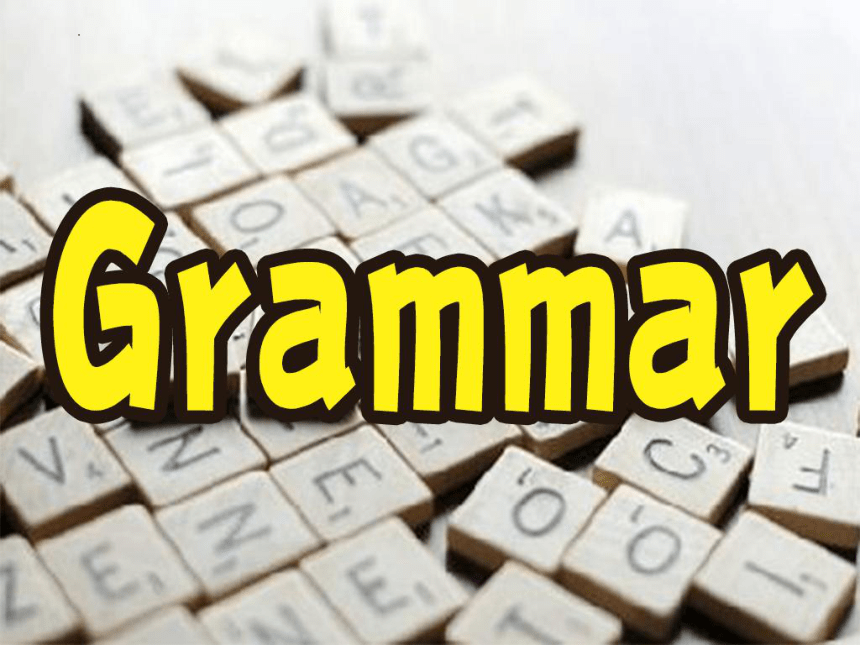
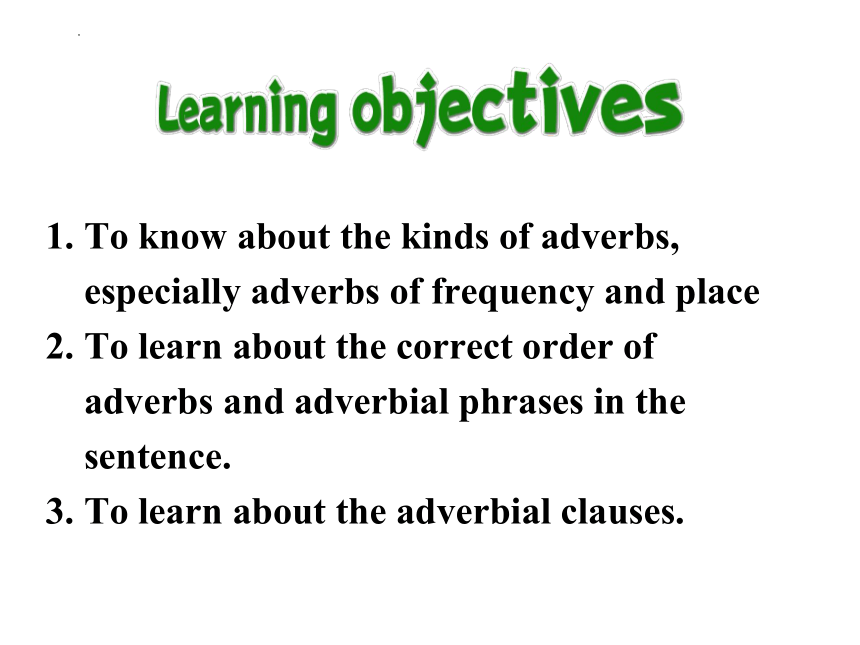



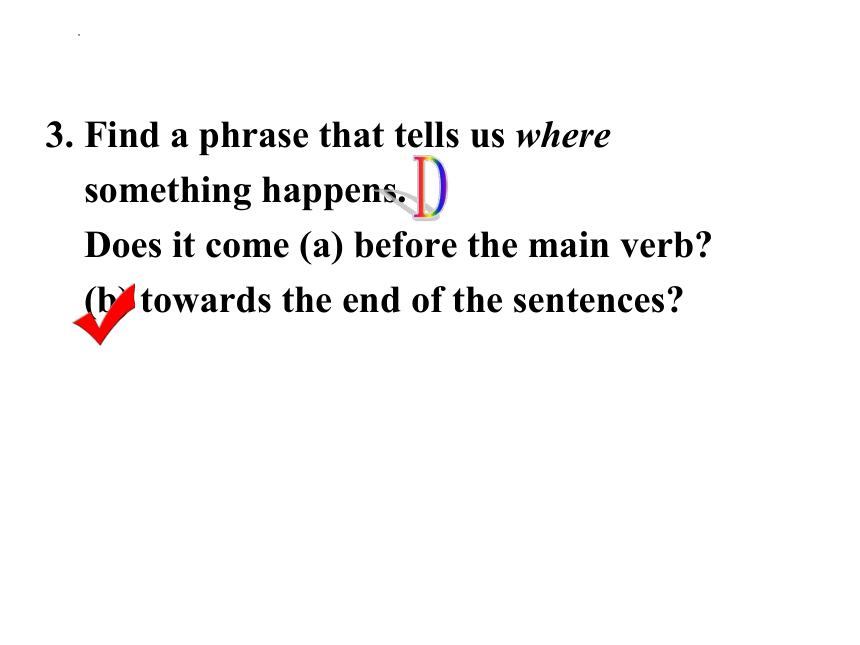

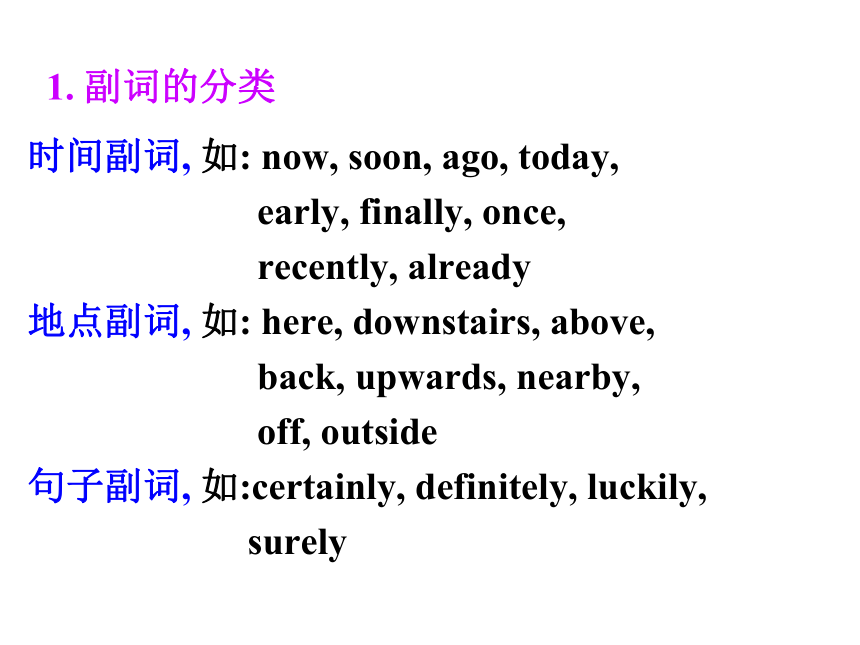
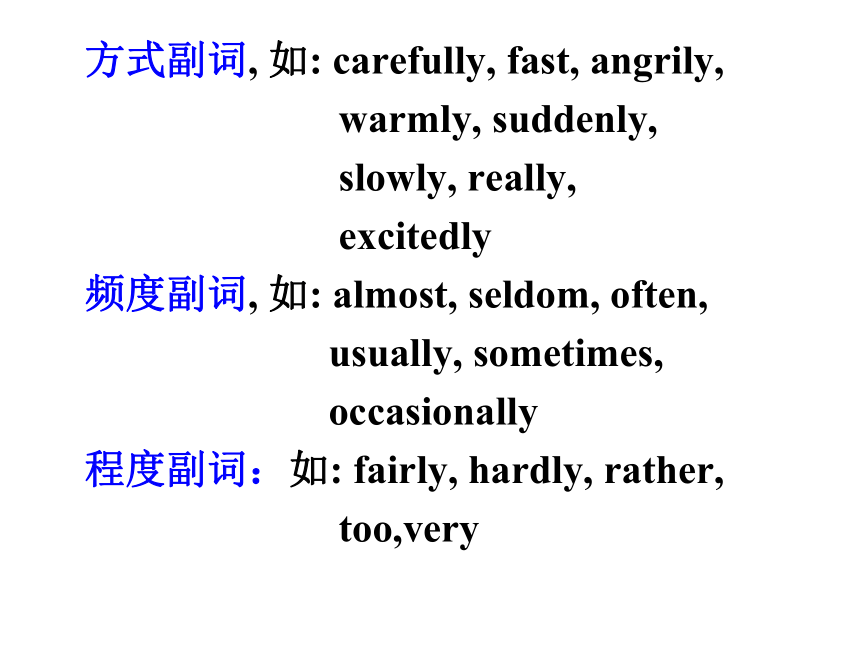


文档简介
(共58张PPT)
外研版
高一年级 (必修2)
Module 6
1. To know about the kinds of adverbs,
especially adverbs of frequency and place
2. To learn about the correct order of
adverbs and adverbial phrases in the
sentence.
3. To learn about the adverbial clauses.
Look at the words in blue in these sentences.
A Martial arts films are often enjoyable but they
are seldom great art.
B …characters leap through the air every now
and then…
C Films like this rarely reach the big screen.
D Wuxia films are popular in China.
E Ang Lee had never directed a martial arts
film before.
F It has occasionally been done.
G Do you often go to the cinema
1. Underline the single words that tell
us how often something happens.
With the verb to be, do these words
come (a) after is or are (b) before
is or are?
Do these words come (a) before the
auxiliary verb (b) after the
auxiliary verb
A
C
E
F
G
Do they come (a) before the main verb
(b) After the main verb
2. Find a phrase that tells us how often
something happens.
Does it come (a) before the main
verb (b) towards the end of the
sentence
B
3. Find a phrase that tells us where
something happens.
Does it come (a) before the main verb
(b) towards the end of the sentences
D
自我探究
副词主要用来修饰动词、形容词、其他副词或者整个句子。副词作状语修饰整个句子时,常是评述性的,表示说话人的态度。
Adverbs of frequency and place
1. 副词的分类
时间副词, 如: now, soon, ago, today,
early, finally, once,
recently, already
地点副词, 如: here, downstairs, above,
back, upwards, nearby,
off, outside
句子副词, 如:certainly, definitely, luckily,
surely
方式副词, 如: carefully, fast, angrily,
warmly, suddenly,
slowly, really,
excitedly
频度副词, 如: almost, seldom, often,
usually, sometimes,
occasionally
程度副词:如: fairly, hardly, rather,
too,very
疑问副词, 如: how, when, where, why放在特殊疑问句句首。
关系副词, 如: when, where, why引导定语从句。
连接副词, 如: how, when, where, why, whether, 引导名词性从句。
2. 频度副词通常放在动词前面。如:
I hardly ever heard him singing.
我几乎从未听他唱过歌。
They occasionally saw him walking along the river bank.
他们偶尔看见他在河边散步。
He seldom went back to his hometown. 他很少回故乡去。
如果句子里有情态动词、助动词或动词be, 就放在这类动词 (的第一个) 的后面。 如:
You must always keep this in mind.
这一点你要经常记在心里。
Do you often go to the cinema
你经常去看电影吗?
He has never been late for the meeting.
他开会从不迟到。
She is seldom ill. 她很少生病。
3. 疑问副词、连接副词、关系副词和一些形容这个句子的副词, 通常都放在句子(或从句) 的开头。如:
How do you like the book you bought yesterday
昨天买的书你觉得怎么样?
Obviously the taxi driver is to be blamed for the accident.
显然, 这位出租车司机应该为这起事故受到责备。
Certainly we should try our best to help this child.
我们的确应该尽力帮助这个孩子。
4. 方式副词通常位于动词(和宾语)的后面。如:
She does everything carefully. 她做什么事都很细心。
In the end he passed the exam successfully. 最后, 他成功地通过了考试。
He is always treating other people rudely. 他待人总是很粗鲁。
Divide these phrases into two groups.
1. words and phrases that tell us how
often something happens
2. phrases that tell us where something
happens
occasionally, (every) now and then,
in the west (of the country),
three times a week, seldom,
from time to time, between the houses,
once a week, rarely,
at the end (of the road),
through the air, every two days
Where:
in the west (of the country) / between the houses /at the end (of the road) /through the air
How often:
occasionally/(every) now and then /three times a week/ seldom/ from time to time/once a week/rarely/ every two days
A. We always watch telly in the morning as we eat our breakfast in the kitchen.
B. I watch films all the time at the weekend.
C. I saw a brilliant one yesterday.
D. Everyone in it acts so brilliantly.
Read the sentences and answer the questions.
Adverbs and adverbial phrases
1. Is brilliant an adjective (describing a noun) or an adverb (telling you about a verb)
adjective , describing “one” (pronoun for “film”)
2. How do you make adverbs from
adjectives Can you make an adverb
from the word quick
You frequently add-ly to the end of
the adjective, e.g. quickly.
3. Can you find words and phrases that answer these questions: When Where How
When : as we eat our breakfast; in the
morning; all the time; at the
weekend; yesterday
Where : in the kitchen
How : brilliantly
Work in pairs. Look at the sentences below. What is the order of When Where How Adverbs in these sentences
1. The child plays happily in his bedroom every evening.
how (happily) where (in his bedroom) when (every evening)
2. Mrs Wang cleaned the house carefully yesterday.
how (carefully) when (yesterday)
3. The students wait quietly at the bus stop each day.
how (quietly) where (at the bus stop) when (each day)
几个副词同时出现在一个句子中, 一般的次序是: 方式副词+地点副词+时间副词 (时间副词也可置于句首)。如:
He was born in Beijing in the year 1980.
他1980年出生在北京。
They were all working hard in the fields at 10:00 yesterday.
昨天10点的时候他们正在田野里辛勤劳动。
该次序也适用于由其他词或词组组成的相应的状语, 即: 方式状语+地点状语+时间状语。如:
Uncle Tom died suddenly in Paris in 1980. 汤姆叔叔于1980年突然在巴黎去世。
After the war, the hero returned with pride to his hometown.
战后, 那位英雄自豪地返回了家乡。
Work in pairs. Put the words in the sentences below in the correct order.
a I of supermarket at yesterday spent lot money the
I spent a lot of money at the supermarket yesterday.
2. street walked down man the quickly the
The man walked quickly down the
street.
3. well you yesterday played
You played well yesterday.
4. worked today student hard the have
The students have worked hard today.
5. her before carefully talk think you to
Think carefully before you talk to her.
6. the were loudly yesterday boys corridor the talking in
The boys were talking loudly in the corridor yesterday.
7. in to drove morning airport they early the
They drove to the airport early in the morning.
选用括号内合适的内容补全下面句子/对
话。
1. Don't eat so ________ (quick / quickly). It's not good for you.
2. ________ (Occasional / Occasionally) I'll have a piece of chocolate, but it's quite ________ (rare / rarely).
3. Can you speak ________ (slow / slowly), please I can't follow.
quickly
Occasionally
slowly
rare
4. Have you seen any good films ________ (recent / recently)
5. The buses run less ________ (frequent / frequently) on Sundays.
6. Jane is studying ________ (hard / hardly) for her examinations. I think she will pass all of them ________ (success / successfully).
7. —Where's Diane
—She was here just now but she left ________ (sudden / suddenly).
recently
frequently
hard
suddenly
successfully
8. He sat ________ (patient / patiently) waiting for the bus.
9. ________ (Actual / Actually), on second thoughts, I don't think I want to go out tonight.
patiently
Actually
1.Adverbial Clauses of Time:(时间状语从句)
Different Kinds of Adverbial Clauses:
2.Adverbial Clauses of Reason(原因状语从句)
3.Adverbial Clauses of Conditions(条件状语从句)
4.Adverbial Clauses of Place (地点状语从句)
5.Adverbial Clauses of Purpose (目的状语从句)
6.Adverbial Clauses of Result(结果状语从句)
7.Adverbial Clauses of Comparison(比较状语从句)
8.Adverbial Clauses of Concession(让步状语从句)
9.Adverb Clauses of Manner(方式状语从句 )
1.Adverbial Clauses of Time:(时间状语从句)
引导词: when, while, as, before, after, since,
until, as soon as, every time, each time,
the moment, by the time , immediately ,
the minute , the second….
1)When he comes here tomorrow, I”ll call you.
2)Henry is in charge of the office when
Mr.Smith is away.
3)He learned to speak English while he was
here.
4)I like tea while she likes coffee.
5)She sang as she worked.
6)It won’t be long before he finishes his writing.
7)I have known him ever since he was a boy.
Exercises:
1.They walked out of the room _________the
meeting was over.
2.They must stay in school _________they are
sixteen.
3.Take the medicine _________you go to bed.
as soon as
by the time
before
4.I knew nothing about it _______he told me.
5.It is more than five years _____we started to
learn English.
6._______he talked on, he got more and more
excited.
7.We should strike _______the iron is hot.
until
since
As
while
2.Adverbial Clauses of Reason(原因状语从句)
引导词: because, since, as,
now that, for
1)The ship changed its course because there
was a storm.
2)Since you are ill,you’d better go to see
the doctor.
3)As Jane was the oldest in this family, she
had to look after the others.
Exercises:
1.The teacher must be strict with you ____
they want you to make great progress.
2.____your father is well again,you no longer
have anything to worry about.
3.The day breaks,_____the birds are singing.
because
Since
for
3.Adverbial Clauses of Condition
(条件状语从句)
引导词:if, unless,whether(whether...or not), as/so long as, only if, providing/provided that, supposing that, in case, on condition that
1)If he had worked harder,he would have
passed the exam.
2)We can’t write to Mary unless she tells us
her address.
3)I will never give up learning as long as I live.
4) We’ll let you use the room on condition
that you keep it tidy.
4.Adverbial Clauses of Place (地点状语从句)
引导词:where ,wherever,
anywhere, everywhere
1)You may find him where his parents live.
2)Wherever you go, you should work hard.
3)You should have put the book where you
found it.
4)Wherever the sea is , you will find seamen.
5.Adverbial Clauses of Purpose
(目的状语从句)
引导词:so that, in order that, lest, in case, for fear that,in the hope that, for the purpose of , to the end that
1)He wrote the name down for fear that(lest)
he should forget it.
2)Say it louder(so)that everyone can hear
you.
3)I am telling you that lest you should make
a mistake.
4)He works hard in order that his family
may be happy.
6.Adverbial Clauses of Result
(结果状语从句)
引导词:so … that, such … that, so that..., such that, to the degree that, to the extent that, to such a degree that,
1)He got up so early that he caught the first
bus.
2)It was so hot a day that they wanted to go
swimming.
3)The wind was so strong that he could
hardly move forward.
4)It is such a good story that I’ll never forget
it.
7.Adverbial Clauses of Comparison
(比较状语从句)
引导词:as(同级比较), than(不同程度的比较),the more … the more …(越来...越...) ; just as …, so…; A is to B what/as X is to Y; no … more than; not so much A as B;the 比较级 ,the 比较级.
1)Man developed earlier than people think.
2)He moves more slowly than his sister does.
3)Jack is not more diligent than John.
4)The film today is not so interesting as the
one yesterday.
8.Adverbial Clauses of Concession
(让步状语从句)
引导词:though, although, even if, even though, while ( 一般用在句首 ),no matter …, in spite of the fact that, whatever, whoever, wherever, whenever.....
1)No matter how hard he tried, she could
not change her mind.
2)He won't listen whatever you may say.
3)The old man always enjoys swimming
even though the weather is rough.
4)I can’t find my pen though I’ve looked
everywhere.
9.Adverb Clauses of Manner
(方式状语从句 )
引导词:as, as if,as though ,
(just) as…so…
1)As water is to fish, so air is to man.
2)Just as we sweep our rooms, so we should
sweep backward ideas from our minds.
3)He looks as if (as though) he had been
hit by lighting.
4)It looks as if the weather may pick up
very soon.
Exercises:
(where, the minute, since, before, however,
although , if, when)
1.If you want to do the experiment again,you'd better be more careful ________ you made a mistake.
2.Jessica was a newcomer to our class,but,________ we didn't know her,she was warmly received.
where
although
3.I was so familiar with him that I recognized his voice ________ I picked up the phone.
4._______ our country has so many good table tennis players,we have to decide on the best ones to take part in the game.
5.You can,________ the sky is clear,see as far as the old temple on top of the mountain,but not today.
when
Since
the minute
6.The two collectors have determined to buy
the precious Egyptian vase,________much
it costs.
7.CCTV is exactly like a window on the
world ________ you sit by it and fix your
attention on what it shows.
8.She was so absorbed in the book that she
had read it for three hours ________ she
realized it.
before
however
if
外研版
高一年级 (必修2)
Module 6
1. To know about the kinds of adverbs,
especially adverbs of frequency and place
2. To learn about the correct order of
adverbs and adverbial phrases in the
sentence.
3. To learn about the adverbial clauses.
Look at the words in blue in these sentences.
A Martial arts films are often enjoyable but they
are seldom great art.
B …characters leap through the air every now
and then…
C Films like this rarely reach the big screen.
D Wuxia films are popular in China.
E Ang Lee had never directed a martial arts
film before.
F It has occasionally been done.
G Do you often go to the cinema
1. Underline the single words that tell
us how often something happens.
With the verb to be, do these words
come (a) after is or are (b) before
is or are?
Do these words come (a) before the
auxiliary verb (b) after the
auxiliary verb
A
C
E
F
G
Do they come (a) before the main verb
(b) After the main verb
2. Find a phrase that tells us how often
something happens.
Does it come (a) before the main
verb (b) towards the end of the
sentence
B
3. Find a phrase that tells us where
something happens.
Does it come (a) before the main verb
(b) towards the end of the sentences
D
自我探究
副词主要用来修饰动词、形容词、其他副词或者整个句子。副词作状语修饰整个句子时,常是评述性的,表示说话人的态度。
Adverbs of frequency and place
1. 副词的分类
时间副词, 如: now, soon, ago, today,
early, finally, once,
recently, already
地点副词, 如: here, downstairs, above,
back, upwards, nearby,
off, outside
句子副词, 如:certainly, definitely, luckily,
surely
方式副词, 如: carefully, fast, angrily,
warmly, suddenly,
slowly, really,
excitedly
频度副词, 如: almost, seldom, often,
usually, sometimes,
occasionally
程度副词:如: fairly, hardly, rather,
too,very
疑问副词, 如: how, when, where, why放在特殊疑问句句首。
关系副词, 如: when, where, why引导定语从句。
连接副词, 如: how, when, where, why, whether, 引导名词性从句。
2. 频度副词通常放在动词前面。如:
I hardly ever heard him singing.
我几乎从未听他唱过歌。
They occasionally saw him walking along the river bank.
他们偶尔看见他在河边散步。
He seldom went back to his hometown. 他很少回故乡去。
如果句子里有情态动词、助动词或动词be, 就放在这类动词 (的第一个) 的后面。 如:
You must always keep this in mind.
这一点你要经常记在心里。
Do you often go to the cinema
你经常去看电影吗?
He has never been late for the meeting.
他开会从不迟到。
She is seldom ill. 她很少生病。
3. 疑问副词、连接副词、关系副词和一些形容这个句子的副词, 通常都放在句子(或从句) 的开头。如:
How do you like the book you bought yesterday
昨天买的书你觉得怎么样?
Obviously the taxi driver is to be blamed for the accident.
显然, 这位出租车司机应该为这起事故受到责备。
Certainly we should try our best to help this child.
我们的确应该尽力帮助这个孩子。
4. 方式副词通常位于动词(和宾语)的后面。如:
She does everything carefully. 她做什么事都很细心。
In the end he passed the exam successfully. 最后, 他成功地通过了考试。
He is always treating other people rudely. 他待人总是很粗鲁。
Divide these phrases into two groups.
1. words and phrases that tell us how
often something happens
2. phrases that tell us where something
happens
occasionally, (every) now and then,
in the west (of the country),
three times a week, seldom,
from time to time, between the houses,
once a week, rarely,
at the end (of the road),
through the air, every two days
Where:
in the west (of the country) / between the houses /at the end (of the road) /through the air
How often:
occasionally/(every) now and then /three times a week/ seldom/ from time to time/once a week/rarely/ every two days
A. We always watch telly in the morning as we eat our breakfast in the kitchen.
B. I watch films all the time at the weekend.
C. I saw a brilliant one yesterday.
D. Everyone in it acts so brilliantly.
Read the sentences and answer the questions.
Adverbs and adverbial phrases
1. Is brilliant an adjective (describing a noun) or an adverb (telling you about a verb)
adjective , describing “one” (pronoun for “film”)
2. How do you make adverbs from
adjectives Can you make an adverb
from the word quick
You frequently add-ly to the end of
the adjective, e.g. quickly.
3. Can you find words and phrases that answer these questions: When Where How
When : as we eat our breakfast; in the
morning; all the time; at the
weekend; yesterday
Where : in the kitchen
How : brilliantly
Work in pairs. Look at the sentences below. What is the order of When Where How Adverbs in these sentences
1. The child plays happily in his bedroom every evening.
how (happily) where (in his bedroom) when (every evening)
2. Mrs Wang cleaned the house carefully yesterday.
how (carefully) when (yesterday)
3. The students wait quietly at the bus stop each day.
how (quietly) where (at the bus stop) when (each day)
几个副词同时出现在一个句子中, 一般的次序是: 方式副词+地点副词+时间副词 (时间副词也可置于句首)。如:
He was born in Beijing in the year 1980.
他1980年出生在北京。
They were all working hard in the fields at 10:00 yesterday.
昨天10点的时候他们正在田野里辛勤劳动。
该次序也适用于由其他词或词组组成的相应的状语, 即: 方式状语+地点状语+时间状语。如:
Uncle Tom died suddenly in Paris in 1980. 汤姆叔叔于1980年突然在巴黎去世。
After the war, the hero returned with pride to his hometown.
战后, 那位英雄自豪地返回了家乡。
Work in pairs. Put the words in the sentences below in the correct order.
a I of supermarket at yesterday spent lot money the
I spent a lot of money at the supermarket yesterday.
2. street walked down man the quickly the
The man walked quickly down the
street.
3. well you yesterday played
You played well yesterday.
4. worked today student hard the have
The students have worked hard today.
5. her before carefully talk think you to
Think carefully before you talk to her.
6. the were loudly yesterday boys corridor the talking in
The boys were talking loudly in the corridor yesterday.
7. in to drove morning airport they early the
They drove to the airport early in the morning.
选用括号内合适的内容补全下面句子/对
话。
1. Don't eat so ________ (quick / quickly). It's not good for you.
2. ________ (Occasional / Occasionally) I'll have a piece of chocolate, but it's quite ________ (rare / rarely).
3. Can you speak ________ (slow / slowly), please I can't follow.
quickly
Occasionally
slowly
rare
4. Have you seen any good films ________ (recent / recently)
5. The buses run less ________ (frequent / frequently) on Sundays.
6. Jane is studying ________ (hard / hardly) for her examinations. I think she will pass all of them ________ (success / successfully).
7. —Where's Diane
—She was here just now but she left ________ (sudden / suddenly).
recently
frequently
hard
suddenly
successfully
8. He sat ________ (patient / patiently) waiting for the bus.
9. ________ (Actual / Actually), on second thoughts, I don't think I want to go out tonight.
patiently
Actually
1.Adverbial Clauses of Time:(时间状语从句)
Different Kinds of Adverbial Clauses:
2.Adverbial Clauses of Reason(原因状语从句)
3.Adverbial Clauses of Conditions(条件状语从句)
4.Adverbial Clauses of Place (地点状语从句)
5.Adverbial Clauses of Purpose (目的状语从句)
6.Adverbial Clauses of Result(结果状语从句)
7.Adverbial Clauses of Comparison(比较状语从句)
8.Adverbial Clauses of Concession(让步状语从句)
9.Adverb Clauses of Manner(方式状语从句 )
1.Adverbial Clauses of Time:(时间状语从句)
引导词: when, while, as, before, after, since,
until, as soon as, every time, each time,
the moment, by the time , immediately ,
the minute , the second….
1)When he comes here tomorrow, I”ll call you.
2)Henry is in charge of the office when
Mr.Smith is away.
3)He learned to speak English while he was
here.
4)I like tea while she likes coffee.
5)She sang as she worked.
6)It won’t be long before he finishes his writing.
7)I have known him ever since he was a boy.
Exercises:
1.They walked out of the room _________the
meeting was over.
2.They must stay in school _________they are
sixteen.
3.Take the medicine _________you go to bed.
as soon as
by the time
before
4.I knew nothing about it _______he told me.
5.It is more than five years _____we started to
learn English.
6._______he talked on, he got more and more
excited.
7.We should strike _______the iron is hot.
until
since
As
while
2.Adverbial Clauses of Reason(原因状语从句)
引导词: because, since, as,
now that, for
1)The ship changed its course because there
was a storm.
2)Since you are ill,you’d better go to see
the doctor.
3)As Jane was the oldest in this family, she
had to look after the others.
Exercises:
1.The teacher must be strict with you ____
they want you to make great progress.
2.____your father is well again,you no longer
have anything to worry about.
3.The day breaks,_____the birds are singing.
because
Since
for
3.Adverbial Clauses of Condition
(条件状语从句)
引导词:if, unless,whether(whether...or not), as/so long as, only if, providing/provided that, supposing that, in case, on condition that
1)If he had worked harder,he would have
passed the exam.
2)We can’t write to Mary unless she tells us
her address.
3)I will never give up learning as long as I live.
4) We’ll let you use the room on condition
that you keep it tidy.
4.Adverbial Clauses of Place (地点状语从句)
引导词:where ,wherever,
anywhere, everywhere
1)You may find him where his parents live.
2)Wherever you go, you should work hard.
3)You should have put the book where you
found it.
4)Wherever the sea is , you will find seamen.
5.Adverbial Clauses of Purpose
(目的状语从句)
引导词:so that, in order that, lest, in case, for fear that,in the hope that, for the purpose of , to the end that
1)He wrote the name down for fear that(lest)
he should forget it.
2)Say it louder(so)that everyone can hear
you.
3)I am telling you that lest you should make
a mistake.
4)He works hard in order that his family
may be happy.
6.Adverbial Clauses of Result
(结果状语从句)
引导词:so … that, such … that, so that..., such that, to the degree that, to the extent that, to such a degree that,
1)He got up so early that he caught the first
bus.
2)It was so hot a day that they wanted to go
swimming.
3)The wind was so strong that he could
hardly move forward.
4)It is such a good story that I’ll never forget
it.
7.Adverbial Clauses of Comparison
(比较状语从句)
引导词:as(同级比较), than(不同程度的比较),the more … the more …(越来...越...) ; just as …, so…; A is to B what/as X is to Y; no … more than; not so much A as B;the 比较级 ,the 比较级.
1)Man developed earlier than people think.
2)He moves more slowly than his sister does.
3)Jack is not more diligent than John.
4)The film today is not so interesting as the
one yesterday.
8.Adverbial Clauses of Concession
(让步状语从句)
引导词:though, although, even if, even though, while ( 一般用在句首 ),no matter …, in spite of the fact that, whatever, whoever, wherever, whenever.....
1)No matter how hard he tried, she could
not change her mind.
2)He won't listen whatever you may say.
3)The old man always enjoys swimming
even though the weather is rough.
4)I can’t find my pen though I’ve looked
everywhere.
9.Adverb Clauses of Manner
(方式状语从句 )
引导词:as, as if,as though ,
(just) as…so…
1)As water is to fish, so air is to man.
2)Just as we sweep our rooms, so we should
sweep backward ideas from our minds.
3)He looks as if (as though) he had been
hit by lighting.
4)It looks as if the weather may pick up
very soon.
Exercises:
(where, the minute, since, before, however,
although , if, when)
1.If you want to do the experiment again,you'd better be more careful ________ you made a mistake.
2.Jessica was a newcomer to our class,but,________ we didn't know her,she was warmly received.
where
although
3.I was so familiar with him that I recognized his voice ________ I picked up the phone.
4._______ our country has so many good table tennis players,we have to decide on the best ones to take part in the game.
5.You can,________ the sky is clear,see as far as the old temple on top of the mountain,but not today.
when
Since
the minute
6.The two collectors have determined to buy
the precious Egyptian vase,________much
it costs.
7.CCTV is exactly like a window on the
world ________ you sit by it and fix your
attention on what it shows.
8.She was so absorbed in the book that she
had read it for three hours ________ she
realized it.
before
however
if
